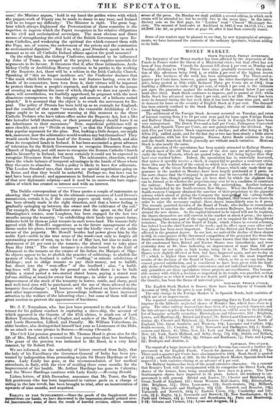The Dublin correspondent of the Times quotes a couple of
statements as showing that "whatever may be the ultimate consequences of Lord Devon's commission, certain it is, if the country papers speak truly, a movement h as been already made in the right clirsction, and that a better feeling is gradually springing up between the owaer and the cultivator of the soil." For example, the Galway Vindicator states that the agent on the Earl of Huntingdon's estates, near Loughree, has been engaged for the last two months among the tenantry, "in subdividing their lands into square farms, hitherto held by them as joint tenants in each town-land. The tenants fully -agreed with Mr. Howell's suggestions as to the future management of the farms under his plans, towards carrying out the kindly views of the noble -owner of the property. Mr. Howell besides had power given him by the noble Earl—noble in the true sense of the word—not only to forgive all -outstanding arrears of rent, up to the 1st of May last, but also to make an .abatement of 25 per cent to the tenants; the abated rent to take place from May 1844." The other instance is a circular issued by the Earl of Altamout to the tenants on the estates of his father, the Marquis of Sligo: its objects appear to be, to abolish the practice of subletting; to abolish the system of what in Scotland is called " crofting," or minute subdivision of holdings ; and to oblige tenants to pay their money, not to bailiffs, but direct into the " rent-office " of the landlord : also, "a building-lease will be given only for ground on which there is to be built within a stated period a two-storied slated house, paying a stated rent (of one shilling at least) for every foot frontage; in order to promote the improvement of the stock of the tenantry in horses, cattle, and sheep, good and well-bred sires will be purchased, and the use of them allowed to the tenantry free of charge "; and bonuses will be allowed on furrow-draining and other improvements. These proceedings indicate at least increased attention to the welfare of the labouring class ; but some of them will need great caution to prevent the appearance of harshness.






















































 Previous page
Previous page